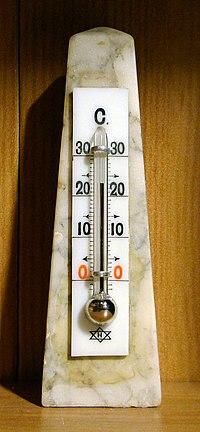
Photo from wikipedia
Abstract. The cross-sensitivity of fiber Bragg grating (FBG) corresponding to strain and temperature is common in practical applications. In order to achieve accurate and simultaneous measurement of temperature and strain,… Click to show full abstract
Abstract. The cross-sensitivity of fiber Bragg grating (FBG) corresponding to strain and temperature is common in practical applications. In order to achieve accurate and simultaneous measurement of temperature and strain, half size of apodized FBG is packaged on the equal strength beam by tin alloy, and the other half is in a free state. The independent temperature and strain can be obtained through a decoupling matrix using the sensitivity difference of the two parts. The experimental results show that the strain sensitivity of the metal-packaged part FBG is 1.04 pm / με, with a correlation coefficient of higher than 0.999. When temperature varies from −10 ° C to 80°C, the temperature sensitivity of the metal-packaged part and the free part of FBG are 35.5 and 11.2 pm / ° C, respectively. This method of using a single FBG to decouple temperature and strain has potential applications in optical fiber sensing.
Journal Title: Optical Engineering
Year Published: 2019
Link to full text (if available)
Share on Social Media: Sign Up to like & get
recommendations!